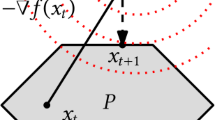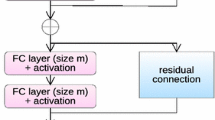Abstract
In this paper, we study stochastic regularized Newton methods to find zeros of nonlinear equations, whose exact function information is normally expensive to calculate but approximations can be easily accessed via calls to stochastic oracles. To handle the potential singularity of Jacobian approximations, we compute a regularized Newton step at each iteration. Then we take a unit step if it can be accepted by an inexact line search condition, and a preset step otherwise. We investigate the global convergence properties and the convergence rate of the proposed algorithm with high probability. We also propose a stochastic regularized Newton method incorporating a variance reduction technique and establishing the corresponding sample complexities in terms of total numbers of stochastic oracle calls to find an approximate solution. Finally, we report some numerical results and demonstrate the promising performances of the two proposed algorithms.





Similar content being viewed by others
Data Availability
The datasets Adult, Gisette and RCV1 analyzed during the current study are available in http://archive.ics.uci.edu/ml/datasets.php. The dataset CINA analyzed during the current study is available in http://www.causality.inf.ethz.ch/data/CINA.html.
References
Aliprantis, C.D., Border, K.C.: Infinite dimensional analysis. Springer Berlin, third ed. A hitchhiker’s guide (2006)
Allen-Zhu, Z., Hazan, E.: Variance reduction for faster non-convex optimization. In: ICML (2016)
Behling, R., Iusem, A.N.: The effect of calmness on the solution set of systems of nonlinear equations. Math. Program. 137(1), 155–165 (2013)
Bianchi, P.: Ergodic convergence of a stochastic proximal point algorithm. SIAM J. Optim. 26(4), 2235–2260 (2016)
Causality workbench team (2008). A marketing dataset. http://www.causality.inf.ethz.ch/data/CINA.html
Chen, S., Pang, L.-P., Guo, F.-F., Xia, Z.-Q.: Stochastic methods based on Newton method to the stochastic variational inequality problem with constraint conditions. Math. Comput. Model. 55(3), 779–784 (2012)
Dvurechensky, P., Gasnikov, A.: Stochastic intermediate gradient method for convex problems with stochastic inexact oracle. J. Optim. Theory App. 171(1), 121–145 (2016)
Fan, J.: Accelerating the modified Levenberg-Marquardt method for nonlinear equations. Math. Comput. 83(287), 1173–1187 (2013)
Guyon, I., Gunn, S., Ben-Hur, A., Dror, G.: Result analysis of the NIPS 2003 feature selection challenge. In: Advances in NIPS (pp. 545-552) (2005)
Iusem, A.N., Jofré, A., Oliveira, R.I., Thompson, P.: Extragradient method with variance reduction for stochastic variational inequalities. SIAM J. Optim. 27(2), 686–724 (2017)
Iusem, A.N., Jofré, A., Oliveira, R.I., Thompson, P.: Variance-based extragradient methods with line search for stochastic variational inequalities. SIAM J. Optim. 29(1), 175–206 (2019)
Iusem, A.N., Jofré, A., Thompson, P.: Incremental constraint projection methods for monotone stochastic variational inequalities. Math. Oper. Res. 44(1), 236–263 (2018)
Jiang, H., Xu, H.: Stochastic approximation approaches to the stochastic variational inequality problem. IEEE Trans. Automat. Contr. 53(6), 1462–1475 (2008)
Kloeden, P.E., Platen, E.: Numerical Solution of Stochastic Differential Equations. Springer, Berlin (1992)
Lan, G.: First-order and Stochastic Optimization Methods for Machine Learning. Springer, Berlin (2020)
Lee, J.D., Lin, Q., Ma, T., Yang, T.: Distributed stochastic variance reduced gradient methods by sampling extra data with replacement. J. Mach. Learn. Res. 18(122), 1–43 (2017)
Lewis, D.D., Yang, Y., Rose, T.G., Li, F.: RCV1: A new benchmark collection for text categorization research. J. Math. Learn. Res. 5, 361–397 (2004)
Li, X., Zhao, T., Arora, R., Liu, H., Haupt, J.: Stochastic variance reduced optimization for nonconvex sparse learning. ICML 48 (pp. 917-925) (2016)
Lord, G., Malham, S.J.A., Wiese, A.: Efficient strong integrators for linear stochastic systems. SIAM J. Numer. Anal. 46(6), 2892–2919 (2008)
Moré, J.J., Sorensen, D.C.: Computing a trust region step. SIAM J. Sci. Comput., 4(3), https://doi.org/10.1137/0904038 (1983)
Mukherjee, I., Canini, K., Frongillo, R., Singer, Y.: Parallel boosting with momentum. In: Joint European Conference on Machine Learning and Knowledge Discovery in Databases (pp. 17-32). Springer, Berlin, Heidelberg (2013, September)
Nemirovski, A., Juditsky, A., Lan, G., Shapiro, A.: Robust stochastic approximation approach to stochastic programming. SIAM J. Optim. 19(4), 1574–1609 (2009)
Nguyen, L.M., Liu, J., Scheinberg, K., Takác̆, M.: SARAH: A novel method for machine learning problems using stochastic recursive gradient. In: ICML, 2613-2621 (2017, July)
Nocedal, J., Wight, S.: Numerical Optimization. Springer, Berlin (2006)
Nunno, G.D., Zhang, T.: Approximations of stochastic partial differential equations. Ann. Appl. Probab. 26(3), 1443–1466 (2016)
Øksendal, B.K.: Stochastic differential equations: an introduction with applications. J. Am. Stat. Assoc. 82(399), 948 (1987)
Papini, M., Binaghi, D., Canonaco, G., Pirotta, M., Restelli, M.: Stochastic variance-reduced policy gradient. In: ICML (Vol. 80, pp. 4026-4035) (2018)
Paquette, C., Scheinberg, K.: A stochastic line search method with convergence rate analysis. SIAM J. Optim. 30(1), 349–376 (2020)
Reddi, S.J., Sra, S., Poczos, B., Smola, A.J.: Proximal stochastic methods for nonsmooth nonconvex finite-sum optimization. In: NeurIPS (pp. 1145-1153) (2016)
Ross, S.M.: Introduction to Stochastic Dynamic Progrmaming. Academic Press (1983)
Shapiro, A., Dentcheva, D., Ruszczyński, A.: Lectures on stochastic programming: modeling and theory. MOS-SIAM Series on Optimization (2009)
Tang, J., Ma, C.: A smoothing Newton method for solving a class of stochastic linear complementarity problems. Nonlinear Anal-Real World Appl 12(6), 3585–3601 (2011)
Tran-Dinh, Q., Pham N.H., Nguyen, L.: Stochastic Gauss-Newton Algorithms for Nonconvex Compositional Optimization. In: ICML (2020)
Tropp, J.A.: User-friendly tail bounds for sums of random matrices. Found. Comput. Math. 12(4), 389–434 (2012)
Ueda, K., Yamashita, N.: On a global complexity bound of the levenberg-marquardt method. J. Optim. Theory Appl. 147(3), 443–453 (2010)
Vaswani, S., Mishkin, A., Laradji, I., Schmidt, M., Gidel, G., Lacoste-Julien, S.: Painless stochastic gradient: interpolation, line search, and convergence rates. arXiv preprint arXiv:1905.09997 (2019)
Wang, Z., Zhou, Y., Liang, Y., Lan, G.: Stochastic variance-reduced cubic regularization for nonconvex optimization. nt. Conf. Artif. Intell. Stat., 2731-2740 (2019)
Ypma, T.J.: Historical development of the Newton-Raphson method. SIAM Rev. 37(4), 531–551 (1995)
Zhang, J., Xiao, L., Zhang, S.: Adaptive stochastic variance reduction for subsampled newton method with cubic regularization. Optimization and Control, ArXiv (2018)
Zhang, J., Xiao, L.: A stochastic composite gradient method with incremental variance reduction. Adv. NeurIPS 32, 9078–9088 (2019)
Zhang, J., Xiao, L.: Stochastic Variance-reduced Prox-linear Algorithms for Nonconvex Composite Optimization. Math. Program., 1-43 (2021)
Zhao, R., Fan, J.: Global complexity bound of the Levenberg-Marquardt method. Optim. Methods Softw. 31(4), 805–814 (2016)
Funding
This work was partially supported by the Major Key Project of PCL (No. PCL2022A05), the National Natural Science Foundation of China (11871453, 12271278, 12026604 and 11971089), and Dalian High-level Talent Innovation Project (2020RD09). The authors have no relevant financial or non-financial interests to disclose.
Author information
Authors and Affiliations
Corresponding author
Ethics declarations
Conflict of interest
The authors have not disclosed any competing interests.
Additional information
Publisher's Note
Springer Nature remains neutral with regard to jurisdictional claims in published maps and institutional affiliations.
Appendix
Appendix
The following lemma refers to Theorem 1.6 in [34] and is about concentration inequalities for vector- and matrix-valued martingales, respectively.
Lemma 5.1
Let \(({\mathcal {U}}_k)^m_{k=0}\) be a given filtration of the \(\sigma \)-algebra \({\mathcal {F}}\).
- (i):
-
Let \((X_k)^m_{k=1}, X_k: \Omega \rightarrow {\mathbb {R}}^n\), be a family of random vectors, satisfying \(X_k\in {{\mathcal {U}}_k}\) and \(\sigma \in {{\mathbb {R}}^m}\) be a given vector with \(\sigma _k\ne 0\), \(k=1,\ldots ,m\). Suppose that \({\mathbb {E}}[X_k\ |{\mathcal {U}}_{k-1}]=0\), and \({\mathbb {E}}[\Vert X_k\Vert ^2\ |{\mathcal {U}}_{k-1}]\le \sigma _k^2\) almost everywhere for all \(k\in {[m]}\). Then it holds
$$\begin{aligned} {\mathbb {E}}[\Vert \sum ^{m}_{k=1}X_k\Vert ^2\ |{\mathcal {U}}_0]\le \Vert \sigma \Vert ^2,\ {\mathbb {P}}(\Vert \sum ^{m}_{k=1}X_k\Vert \ge \tau \Vert \sigma \Vert \ |{\mathcal {U}}_0)\le \tau ^{-2},\ \ \forall \tau >0 \end{aligned}$$almost everywhere.
- (ii):
-
Let \((X_k)^m_{k=1}\), \(X_k: \Omega \rightarrow {\mathbb {R}}^{d_1\times d_2}\), be a sequence of random matrices satisfying \(X_k\in {{\mathcal {U}}_k}\). Suppose that \({\mathbb {E}}[X_k\ |{\mathcal {U}}_{k-1}]=0\), and there exists a positive constant R such that \(\Vert X_k\Vert \le R\) almost everywhere for all \(k\in {[m]}\). Define \(\nu ^2=\max \{\Vert \sum _{k=1}^m {\mathbb {E}}(X_kX_k^T)\Vert ,\Vert \sum _{k=1}^m {\mathbb {E}}(X_k^TX_k)\Vert \}\). Then it holds
$$\begin{aligned} {\mathbb {P}}(\Vert \sum ^{m}_{k=1}X_k\Vert \ge t\ |{\mathcal {U}}_0)\le (d_1+d_2)\cdot \exp { (\frac{-t^2/2}{\nu ^2+Rt/3} )},\ \ \forall t>0 \end{aligned}$$almost everywhere.
Rights and permissions
Springer Nature or its licensor (e.g. a society or other partner) holds exclusive rights to this article under a publishing agreement with the author(s) or other rightsholder(s); author self-archiving of the accepted manuscript version of this article is solely governed by the terms of such publishing agreement and applicable law.
About this article
Cite this article
Wang, J., Wang, X. & Zhang, L. Stochastic Regularized Newton Methods for Nonlinear Equations. J Sci Comput 94, 51 (2023). https://doi.org/10.1007/s10915-023-02099-4
Received:
Revised:
Accepted:
Published:
DOI: https://doi.org/10.1007/s10915-023-02099-4




